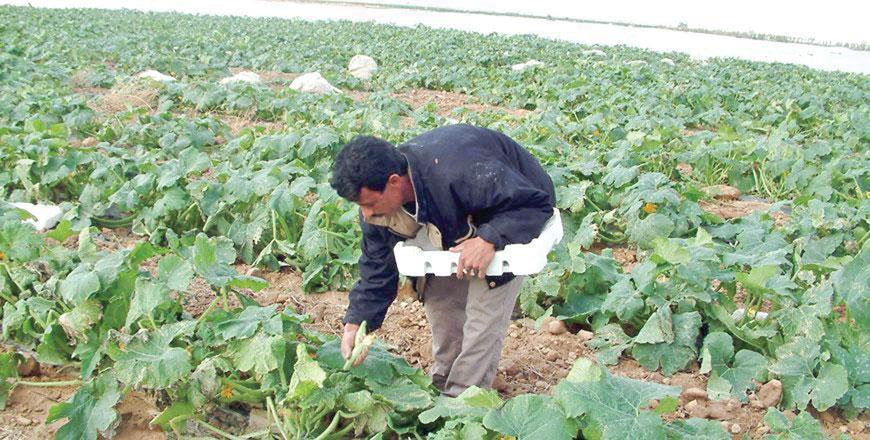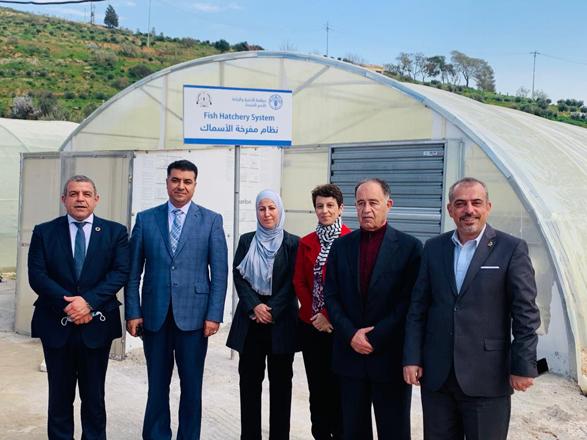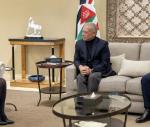You are here
Agriculture Ministry unveils 2020-2025 strategy worth JD591m to revive sector
By JT - Aug 24,2020 - Last updated at Aug 24,2020

A key theme of the agriculture strategy is creating 65,000 jobs in a five-year period and replacing 21,000 foreign workers with Jordanians, according to Acting Minister of Agriculture Saleh Kharabsheh (JT file photo)
AMMAN — The Ministry of Agriculture on Monday announced the 2020-2025 National Agricultural Development Strategy at an estimated cost of JD591-million, focusing on the digitisation and restructuring of the sector and boosting its productivity.
The strategy envisages a total of 174 interventions and projects, said Acting Minister of Agriculture Saleh Kharabsheh during a press conference, the Jordan News Agency, Petra, reported.
He explained that the strategy will be financed via a host of channels, including JD179 from the Treasury; JD310 million in lending from the Agricultural Credit Corporation and JD80 million from foreign aid and grants, noting that the funding gap is estimated at JD22 million.
Citing the strategy’s performance indicators, the minister said they include increasing the agricultural GDP as share of total GDP from JD2.6 billion now to JD3.66 billion by 2025 and boosting the added-value of agriculture to JD2.48 billion from JD1.6 billion.
Another key theme of the strategy is creating 65,000 jobs in the five-year period and replacing 21,000 foreign workers with Jordanians, Kharabsheh noted, adding that the strategy is also intended to increase the number of farmers using digital government-run agricultural services by 30 per cent.
Another focus area of the strategy is export costs reduction to pave the way for a 15 per cent increase in agricultural exports. Accordingly, the strategy is designed to help cut air and land freight costs by 12 per cent and increase the productivity of food and agricultural manufacturers by 18 per cent by 2025.
Furthermore, the strategy is pursuing a 10 per cent increase in the forest area by 2025, Kharabsheh indicated.
Kharabsheh said that the coronavirus pandemic crisis brought to the fore a number of challenges facing the agricultural sector that were not addressed in previous agricultural policies.
The lack of comprehensive agricultural databases comes at the forefront of these challenges, the minister said, noting “poor digitisation or utilisation of modern technologies in agriculture”.
According to Kharabsheh, these challenges limited the agro produce’s access to retailers and consumers when the Kingdom enforced total lockdowns a few months ago.
Therefore, the minister said, the government revisited agricultural policies and endorsed the 2020-2025 National Agricultural Development Strategy focusing on the following priorities: The restructuring, digitisation of the agricultural sector, the utilisation of modern technology, enhancing production and productivity, focusing on strategic crops, developing the logistics chain of operations, uplifting the agro-processing chain, developing the export chain, and expanding forest and pasture areas.
Kharabsheh noted that the ministry reviewed the strategy with local and international partners, including the Food and Agriculture Organisation of the United Nations, the World Food Programme, the World Bank and the United Nations Economic and Social Commission for Western Asia, to ensure it is comprehensive and consistent with best global practices.
All other sub-strategies were incorporated in the new strategy with the aim of having a uniform post-COVID-19 agricultural policy, Kharabsheh pointed out, adding: “The strategies that were integrated included, the fish and marine products strategy, the date palm strategy, the rangelands strategy and forest policies.”
Given the importance of agriculture in the food supply chain, Kharabsheh noted, the government has introduced a number of finance and credit incentives to boost producers’ resilience in crisis time and also expanded the Agricultural Risk Fund’s umbrella to cover all risks.
The government has also provided a set of fee exemptions to help organise the agricultural sector, support the agricultural exports chain, and encourage agricultural cooperatives to assume their role in employment and job creation, he said.
The minister indicated that the government will establish centres for agricultural services and training on modern agricultural technology, especially aquaponics and hydroponics, to enable unemployed Jordanians to gain skills much-needed in the agricultural labour market.
Detailing the strategy’s themes and focus areas, Kharabsheh said the restructuring of the sector entails the following: Amending the Jordan Farmers Union’s law, revisiting the agricultural cooperatives’ bylaw, establishing a comprehensive agricultural database, relieving farmers from registration fees when licensing an individual enterprise, exempting cooperatives from registration fees as well as relieving new cooperatives from service and auditing fees.
Detailing another theme of the strategy, the utilisation of modern technology, the minister indicated that 17 training centres will be established and a funding tranche will be available to hydroponics, aquaponics, and fish farming projects.
In a bid to boost exports, the strategy relieves farmers and seed companies as well as exports from testing fees for a year. This will be supported by the launch of an agro produce quality and safety system.
Related Articles
AMMAN — The Representative of the Food and Agriculture Organisation of the United Nations (FAO) in Jordan Nabil Assaf, Agriculture Minister
AMMAN — The agricultural sector contributes to around 20 per cent of the national economy and 6 per cent of the GDP, Agriculture Minister Kh
AMMAN — A project aimed at enhancing resilient livelihoods and food security for more than 260,000 Jordanians and Syrian refugees through su
















